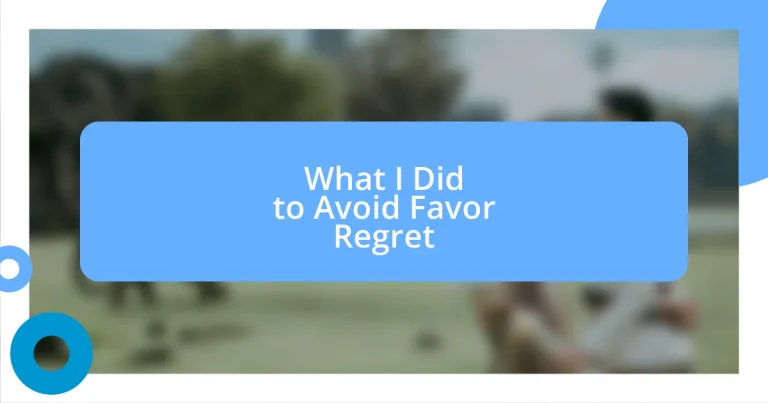Key takeaways:
- Favor regret arises when helping others leads to personal sacrifices, highlighting the need for self-awareness about one’s motivations and boundaries.
- Establishing clear boundaries and communicating expectations fosters healthy relationships and prevents misunderstandings, making interactions more fulfilling.
- Practicing mindfulness and reflecting on past experiences can empower personal growth by helping individuals recognize patterns in their decision-making and emotional responses.
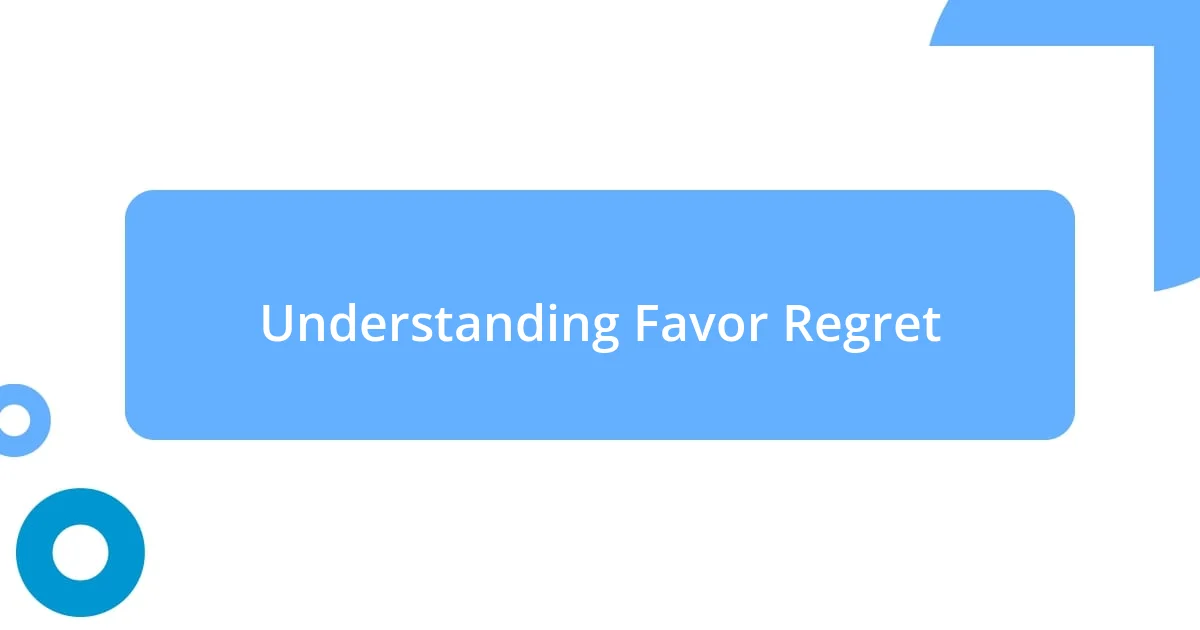
Understanding Favor Regret
Favor regret often creeps in when we realize that the help we offered might have come at a personal cost. I remember a time when I helped a friend move. It wasn’t just the labor; it took away my weekend, and soon, my charity felt like a burden. Did I do it for them or myself? That lingering thought can haunt you.
When we extend our favor, we anticipate gratitude, but sometimes, it breeds resentment. Have you ever felt taken for granted after lending a helping hand? I once volunteered to cover a colleague’s shift, hoping for a favor in return. Instead, it became an expectation, and hindsight made me wonder if my kindness was misinterpreted.
Understanding this emotional turmoil is essential. It makes us question our boundaries and motivations. While helping others is fulfilling, it’s vital to safeguard our own needs. I’ve learned that clarity about what I’m willing to give saves me from the pangs of favor regret. In reflecting on my experiences, I now ask myself—am I helping or overextending? This self-awareness can reshape our interactions profoundly.
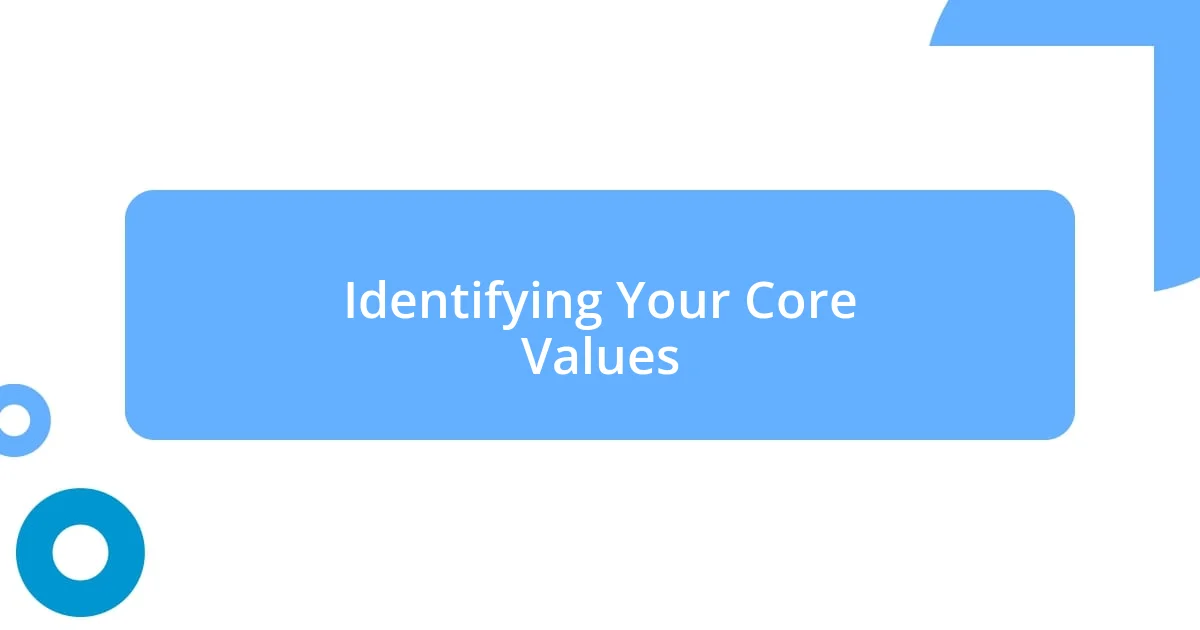
Identifying Your Core Values
Identifying your core values is a pivotal step in preventing favor regret. Core values act as your internal compass, guiding your decisions and interactions. I recall a moment where I felt stretched thin, agreeing to assist multiple friends in a single week. In retrospect, I recognized that my desire to be helpful overwhelmed my commitment to personal time. Understanding what truly matters to me—like balance and genuine connections—has made it easier to navigate these situations without feeling overburdened.
To help clarify your core values, consider these guiding questions:
– What activities bring me joy and fulfillment?
– Which relationships make me feel supported and valued?
– When have I felt most proud of my choices?
– What boundaries have I not respected in the past?
– How do my values align with my long-term goals?
Reflecting on these aspects can illuminate what’s important in your life, helping you to make decisions that align with your true self.
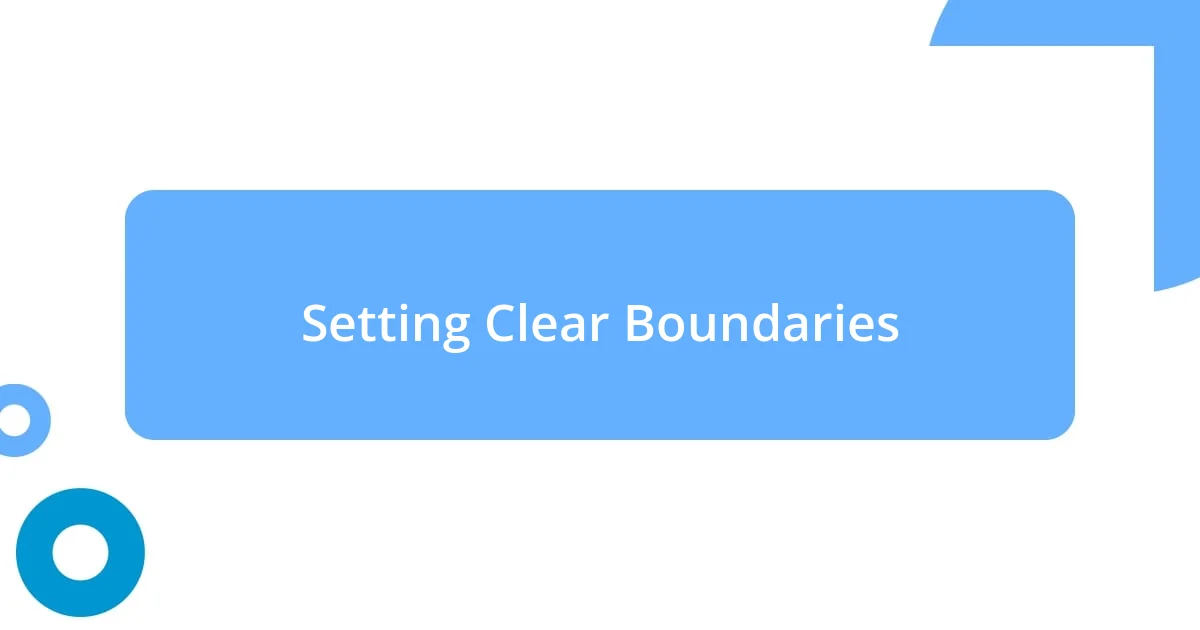
Setting Clear Boundaries
Setting clear boundaries is essential in avoiding favor regret. Over time, I’ve realized that boundaries aren’t just about saying “no”; they represent what I truly value. I remember a time when I agreed to organize an event for a friend without considering the time commitment. The experience ended up draining me, leaving me resentful rather than fulfilled. Now, I assess each request more critically, ensuring that it aligns with my priorities and that my time is protected.
In my experience, articulating boundaries clearly can transform my relationships. A close friend once asked for consistent support with her freelance projects, which I initially thought I could manage. However, it quickly became overwhelming. By expressing my limitations candidly, we reached a compromise that respected both our needs. That taught me that clear communication can not only protect my time but also strengthen my connections.
Let’s not forget, setting boundaries is a continuous process. I often ask myself, “How does this request fit into my life?” This self-reflection helps me maintain my balance. I’ve learned that being kind to myself by upholding my boundaries ultimately benefits those I care about, as it allows me to be truly present when I do choose to help.
| Boundary Setting | Favor Regret |
|---|---|
| Establishes personal limits | Leads to feelings of resentment |
| Promotes healthy relationships | Creates misunderstandings |
| Encourages self-reflection | Results in emotional turmoil |
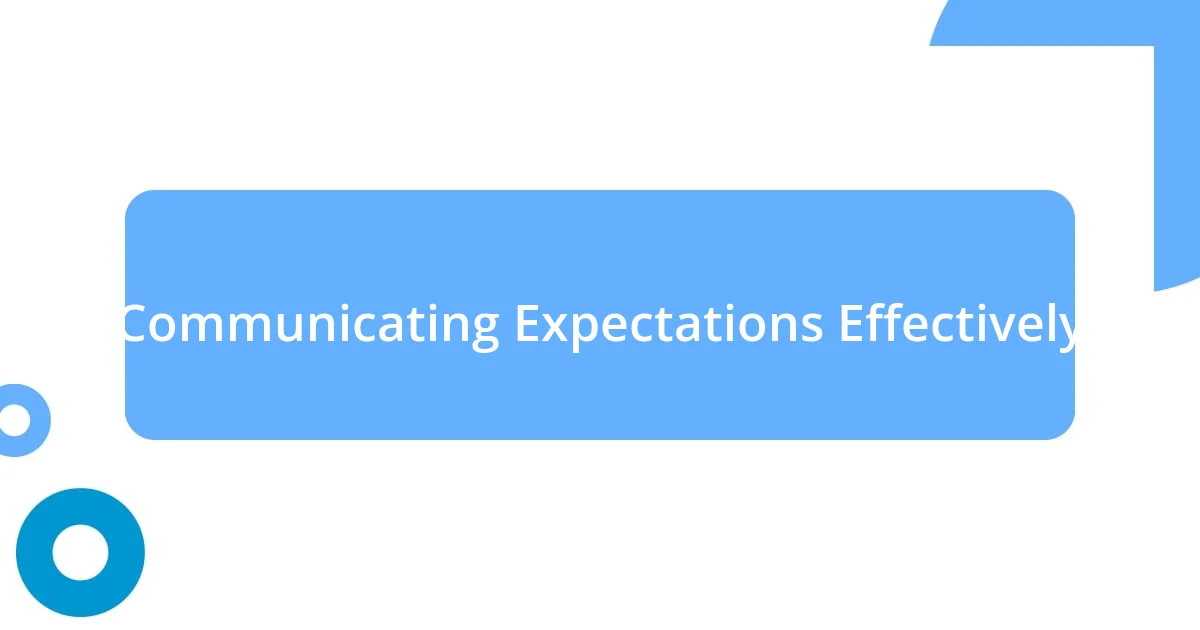
Communicating Expectations Effectively
Communicating Expectations Effectively
When I think about the times I’ve faced favor regret, I often realize that much of it stemmed from unclear expectations. In one instance, I jumped at the chance to help a friend with her wedding planning, envisioning a fun collaboration. However, I soon discovered that her vision clashed with mine, leading to stress and frustration. It taught me that sharing our expectations upfront can prevent misunderstandings.
Engaging in open discussions about what we each need can set the stage for positive interactions. I once had a colleague who assumed I’d take on a large project without discussing it first. When I finally clarified my availability, not only did it alleviate my stress, but it also deepened our collaboration. This experience reminded me that direct communication can reduce tension and enhance teamwork.
I’ve learned to ask questions that clarify both sides’ expectations. For example, before committing to projects or requests, I ask, “What does this role entail, and what are the deadlines?” This simple step transforms the conversation, allowing both parties to align their priorities. Effective communication goes a long way in ensuring that everyone’s on the same page, making the experience more enjoyable for everyone involved.
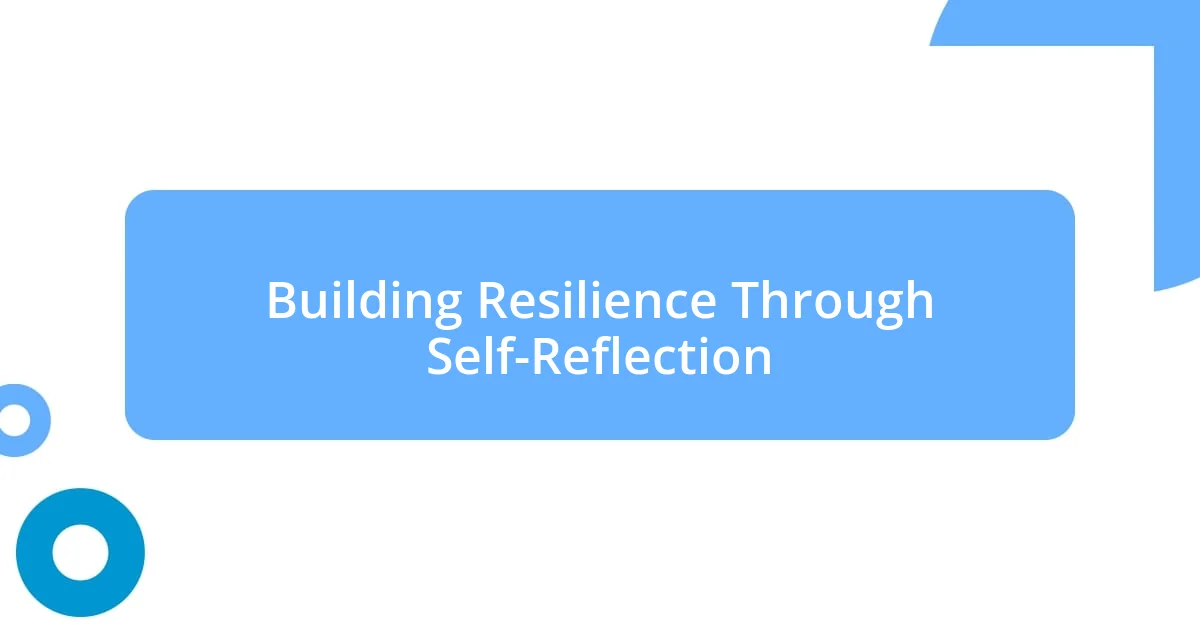
Building Resilience Through Self-Reflection
Reflecting on my past experiences, I’ve realized that self-reflection is a cornerstone of resilience. After an overwhelming period of saying “yes” to every request, I took time to reassess my choices. One quiet afternoon, sitting with my journal, I wrote down my feelings. It struck me how often I prioritized others over myself, and that realization was both humbling and empowering. Isn’t it fascinating how taking a moment to reflect can unveil patterns we didn’t even recognize?
In my journey, I’ve found that asking myself probing questions helps distill my thoughts. For instance, I’ve started to ask, “What did I learn from this situation?” This inquiry not only guides me toward understanding my emotions but also arms me with lessons for the future. There’s something liberating about transforming experiences—both good and bad—into stepping stones for personal growth. It’s a practice I encourage everyone to try; what insights might arise from your own reflections?
Recently, I revisited a moment when I agreed to lead a community project, only to feel overwhelmed. During self-reflection, I realized I was seeking external validation rather than honoring my own needs. The emotional weight of that choice lingered longer than anticipated. Now, I’m more attuned to recognizing when my motivations sway from what truly serves me. Through self-reflection, I’ve cultivated resilience—not by avoiding mistakes but by learning to navigate them with grace and intention.
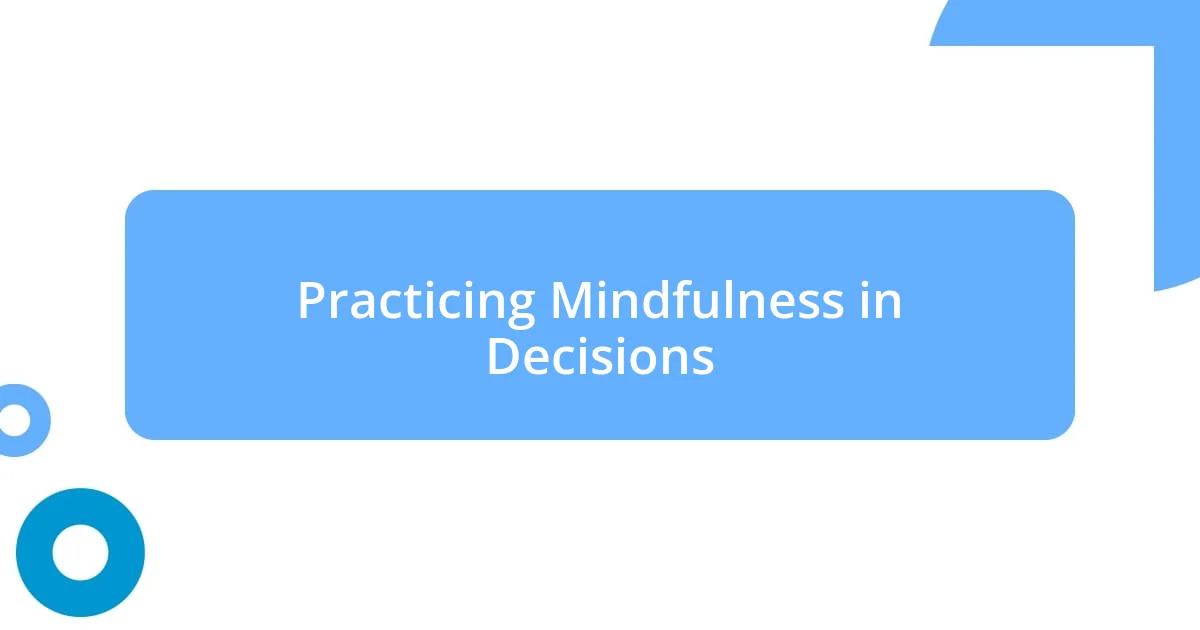
Practicing Mindfulness in Decisions
I often find that practicing mindfulness in my decision-making transforms how I view choices, particularly in preventing favor regret. In one instance, I had to decide whether to attend a weekend retreat or stay back to catch up on work. Instead of rushing into a choice, I took a few deep breaths and centered myself. That moment of mindfulness allowed me to explore how each option felt emotionally, leading me to recognize that the retreat would nourish my soul, while work could wait. It’s amazing how just a bit of awareness can shift our perspective.
I remember a time when I was faced with a request from a neighbor to watch their dog while they were away. My instinct was to say yes immediately, fueled by a sense of obligation. However, pausing to assess my own feelings brought clarity—I realized I was already stretched thin. This break in my usual response-urge allowed me to communicate honestly and let them know I couldn’t commit this time. Practicing mindfulness in my choices not only spared me from regret but helped foster more genuine connections. How often do we leap into decisions without truly feeling them out?
Mindfulness also sharpens my awareness of the consequences of my choices. For example, during a dinner with friends, I pondered whether to indulge in dessert. Savoring the moment, I realized that the dish was calling to me purely out of impulse, not genuine desire. By weighing my options mindfully, I chose to skip it and felt a sense of empowerment and control that lingered long after the meal. Does taking a moment to pause before decisions resonate with you, too? It’s a small practice that invites clarity and intention into our daily lives, emphasizing the beauty of conscious choice.
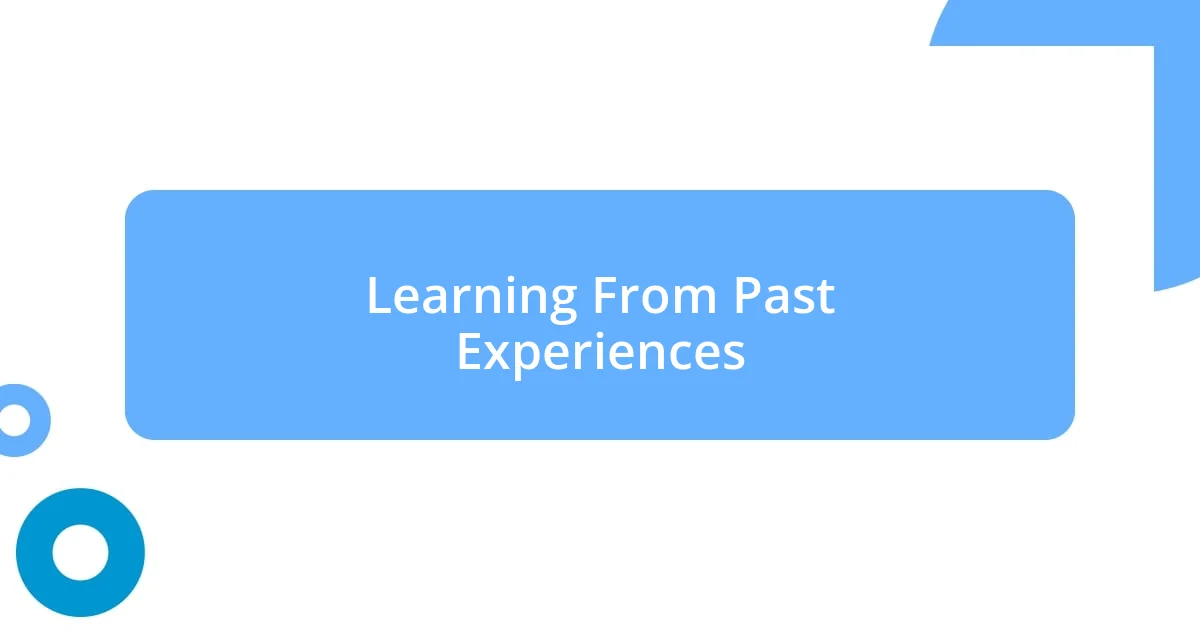
Learning From Past Experiences
Reflecting on past experiences often unveils crucial lessons that I had overlooked at the moment. I recall an instance when I jumped into a group project without fully assessing my capabilities. The stress of coordinating with others while managing my own responsibilities taught me that it’s vital to recognize my limits. Have you ever felt the consequences of acting too hastily, only to wish you had paused for reflection?
Through revisiting my choices, I discovered patterns that shaped my decision-making. There was a time when I took on extra shifts at work, believing it would impress my boss. Instead, I found myself exhausted and less effective. By unpacking that experience, I recognized a pattern of seeking approval at the expense of my well-being. How many of us chase validation, forgetting that our true worth lies in self-acceptance?
Sometimes, I find that embracing vulnerability is key to understanding my regrets. A while back, I hesitated to voice my ideas during a brainstorming session, fearing they might be dismissed. Later, reflecting on that moment helped me see how silence can be more costly than speaking up. The truth is, every experience—success or regret—contributes to my growth narrative. What could you gain by being more open to expressing yourself?












